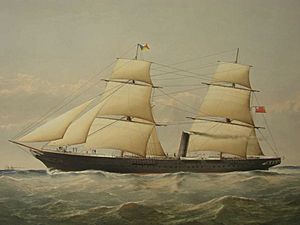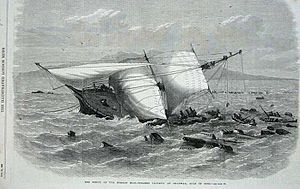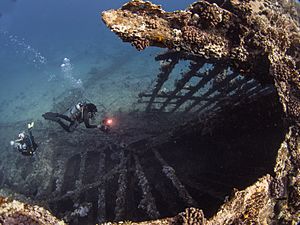SS Carnatic facts for kids

SS Carnatic
|
|
Quick facts for kids History |
|
|---|---|
| Name | SS Carnatic |
| Operator | Peninsula & Orient Steam Navigation Company |
| Builder | Samuda Brothers, Cubitt Town, London |
| Laid down | early 1862 |
| Launched | 12 June 1862 |
| Completed | 25 April 1863 |
| Fate | Wrecked, 12 September 1869 |
| General characteristics | |
| Type | Steam ship |
| Tonnage | 1,776 GRT |
| Length | 89.4 m (293 ft 4 in) |
| Beam | 11.6 m (38 ft 1 in) |
| Draught | 7.8 m (25 ft 7 in) |
| Propulsion | Humphrys, Tennant and Dykes 4-cylinder compound inverted steam engine, 2,442 hp (1,821 kW), single shaft |
| Sail plan | Brig |
| Speed | 12 knots (22 km/h; 14 mph) |
| Capacity | 250 passengers |
| Notes | 31 persons lost in the shipwreck |
The SS Carnatic was a British steamship built in 1862-1863. It was made by Samuda Brothers in Cubitt Town, London. The ship belonged to the Peninsular and Oriental Steam Navigation Company (P&O).
The Carnatic sailed on the route from Suez to Bombay (now Mumbai). This was before the Suez Canal opened. This route offered a fast way to travel from Britain to India by steamship. Travelers would cross land from Alexandria to Suez. Sailing around the Cape of Good Hope was the other option. Steamships were not yet cost-effective for such long journeys.
The Carnatic was one of the first British steamships to use a special engine. This engine was called a compound engine. It used much less fuel than other ships of its time. P&O built a few other ships with these efficient engines. These included the Poonah (1863), Golconda (1863), and Baronda (1864).
In 1869, the Carnatic hit a coral reef in the Red Sea. It broke apart the next morning, and 31 people lost their lives. The ship's wreck was found again in 1984. Today, it is a popular place for scuba diving.
Contents
Building the SS Carnatic
The construction of the Carnatic began in early 1862. It was first planned to be named Mysore. However, it was launched as Carnatic on June 12, 1862. The ship was finished and ready to sail by April 25, 1863.
The Carnatic had a special hull design. It was built with an iron frame and wooden planks. This is known as composite construction. The ship also had square-rigged sails. A powerful 4-cylinder compound inverted steam engine powered it. This engine, made by Humphrys & Tennant, produced 2,442 horsepower. It turned a single propeller.
Engine Technology
The compound engine was quite new for British ships at that time. The Carnatic's boiler operated at a pressure of 26 psi (pounds per square inch). Higher pressures were not allowed by the Board of Trade. Even at this lower pressure, the engine was very efficient. It used just over 2 pounds of coal per horsepower-hour. This was a great achievement for its time.
The Shipwreck of the Carnatic
On September 12, 1869, the Carnatic ran aground. It hit the Sha`b Abu Nuhas coral reef. This reef is near Shadwan Island in the Red Sea.
What Happened During the Grounding?
After the ship hit the reef, Captain P. B. Jones believed the ship was safe. He thought the pumps were working and the ship would not sink. Passengers asked to leave the ship many times. However, the Captain told them the ship was fine. He also said that another P&O ship, the Sumatra, would soon pass by and rescue them.
Things stayed calm on board for a while. But around 2 a.m. on September 14, water filled the ship's boilers. This caused the ship to lose all power and lights.
The Ship Breaks Apart
At 11 a.m. the next morning, after 34 hours on the reef, Captain Jones finally gave the order to abandon ship. As the first four passengers got into a lifeboat, the Carnatic suddenly broke in half. Sadly, 31 people drowned. The people who survived made it to the barren island of Shadwan. The next day, the Sumatra arrived and rescued them.
Gold and Rumors
The Carnatic was carrying a lot of gold, worth £40,000. This would be over £1,000,000 in today's money. A salvage operation took place two weeks later to recover the gold. All the gold was reported as found. However, rumors still exist that some treasure might remain. These stories have added to the mystery of the ship.
Aftermath for the Captain
Captain Jones was called back to England for an official investigation. The inquiry called him "a skillful and experienced officer." But they also said that "proper care" was not taken. This led to the disaster. Captain Jones's Master's certificate was suspended for nine months. He never went back to sea after that.
The Carnatic Today
The wreck of the Carnatic was found again in May 1984. It is now a very popular site for scuba diving. Divers can explore the remains of this historic ship in the Red Sea.
 | Shirley Ann Jackson |
 | Garett Morgan |
 | J. Ernest Wilkins Jr. |
 | Elijah McCoy |



